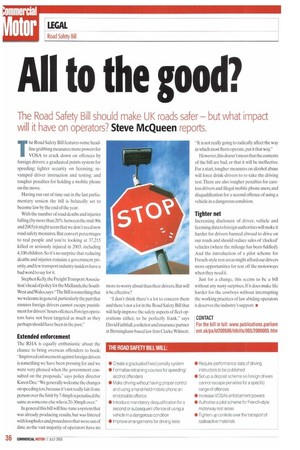to the good?
Page 38

If you've noticed an error in this article please click here to report it so we can fix it.
The Road Safety Bill should make UK roads safer — but what impact
will it have on operators? Steve McQueen reports.
The Road Safety Bill features some headline grabbing measures:more powers for VOSA to crack down on offences by foreign drivers a graduated points system for speeding; tighter security on licensing; revamped driver instruction and testing; and tougher penalties for holding a mobile phone on the move.
Having run out of time out in the last parliamentary session the bill is belatedly set to become law by the end of the year.
With the number of road deaths and injuries falling (by more than 20% between the mid-90s and 2003) it might seem that we don't need new road safety measures. But convert percentages to real people and you're looking at 37,215 killed or seriously injured in 2003, including 4,100 children. So it's no surprise that reducing deaths and injuries remains a government priority, and few transport industry insiders have a bad word to say for it.
Stephen Kelly, the Freight Transport Association's head of policy for the Midlands,the SouthWest and Wales, says:"The Bill is something that we welcome in general, particularly the part that ensures foreign drivers cannot escape punishment for drivers' hours offences.Foreign operators have not been targeted as much as they perhaps should have been in the past.
Extended enforcement
rlhe RHA is equally enthusiastic about the chance to bring overseas offenders to book: "Improved enforcement against foreign drivers is something we have been pressing for and we were very pleased when the government consulted on the proposals," says policy director Karen Dee,"We generally welcome the changes on speeding too, because it's not really fair if one person over the limit by 7-8mph is penalised the same as someone else who is 20-30mph over."
In general this bill will fine-tune a system that was already producing results, but was littered with loopholes and procedures that were out of date, so the vast majority of operators have no more to worry about than their drivers. But will it be effective?
"I don't think there's a lot to concern them and there's not a lot in the Road Safety Bill that will help improve the safety aspects of fleet operations either, to be perfectly frank," says David Faithfull,a solicitor and insurance partner at Birmingham-based law firm Clarke Wilmott. "It is not really going to radically affect the way in which most fleets operate, put it that way."
However,thisdoesn't mean that the contents of the bill are bad, or that it will be ineffective. For a start, tougher measures on alcohol abuse will force drink-drivers to re-take the driving test. There are also tougher penalties for careless drivers and illegal mobile phone users, and disqualification for a second offence of using a vehicle in a dangerous condition.
Tighter net
Increasing disclosure of driver, vehicle and licensing data to foreign authorities will make it harder for drivers banned abroad to drive on our roads and should reduce sales of 'clocked' vehicles (where the mileage has been fiddled). And the introduction of a pilot scheme for French-style rest areas might afford our drivers more opportunities for rest off the motorways when they need it.
Just for a change, this seems to be a bill without any nasty surprise& If it does make life harder for the cowboys without interrupting the working practices of law abiding operators it deserves the industry's support. • CONTACT
For the bill in full: www.publicalions.parliam ent.uk/paild200506/1dbills/005/2006005.blm










































































































































































































